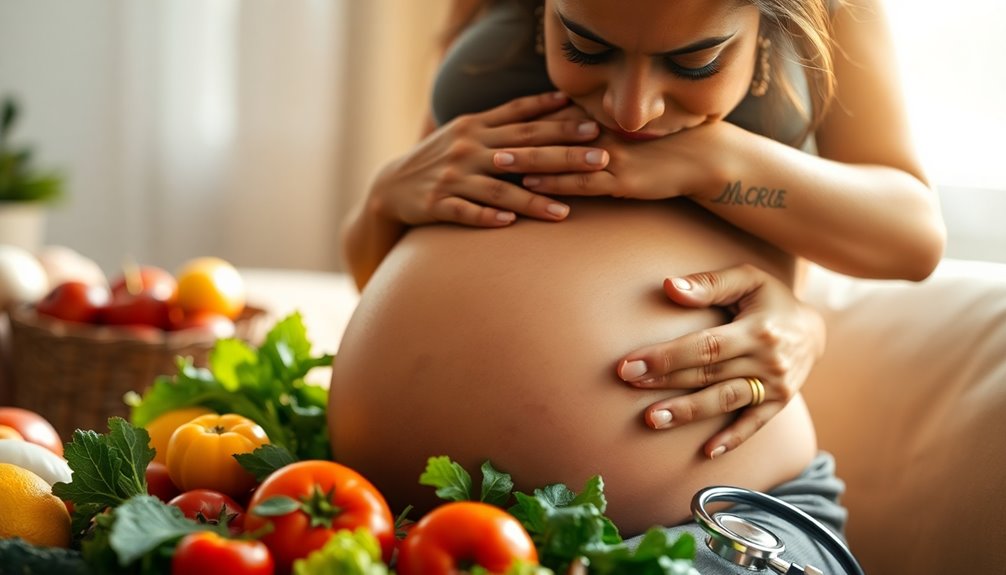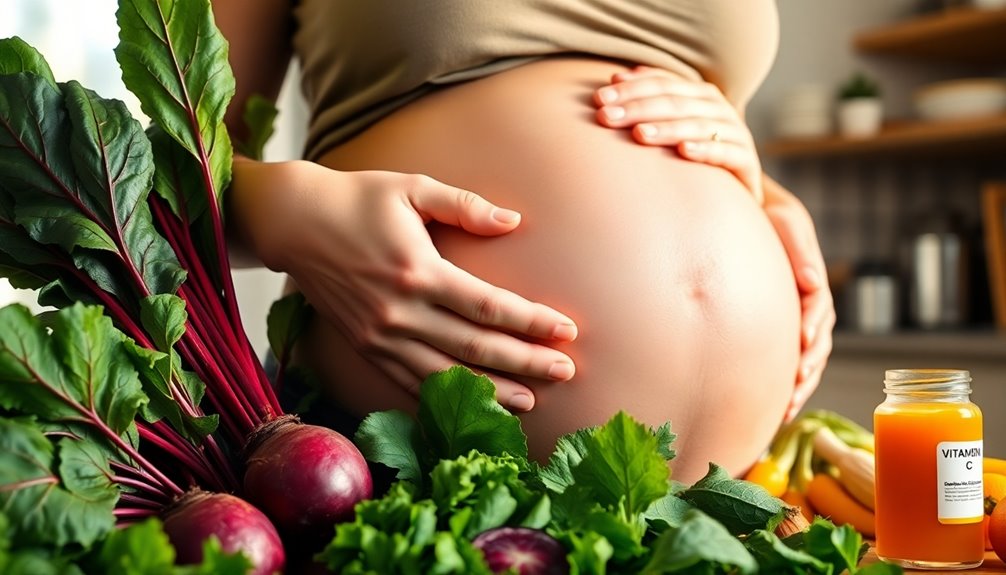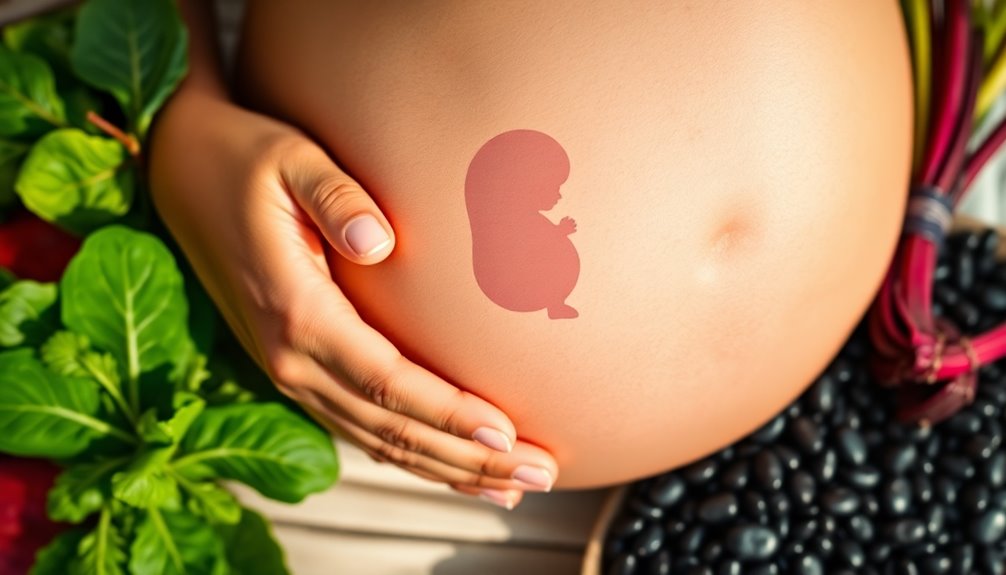Iron deficiency during pregnancy is a serious issue that can impact both your health and your baby's development. Increased iron demands, insufficient dietary intake, and closely spaced pregnancies can all contribute to this condition. It can lead to risks like premature birth, low birth weight, and even developmental delays for your child. Plus, it can affect you, causing extreme fatigue and other symptoms. Discover how to prevent and manage this condition effectively for a healthier pregnancy.
Key Takeaways
- Iron deficiency anemia during pregnancy can lead to premature birth and low birth weight in infants.
- Expectant mothers may experience extreme fatigue, dizziness, and pale skin as symptoms of low iron levels.
- Insufficient iron can result in long-term developmental issues and behavioral challenges for children.
- Prenatal vitamins with 27 mg of iron and iron-rich foods are crucial for preventing deficiency.
- Regular check-ups and screenings for anemia are essential to ensure maternal and infant health during pregnancy.
What Causes Iron Deficiency Anemia During Pregnancy?

Iron deficiency anemia during pregnancy often stems from the increased iron demands your body faces as it works to support both you and your developing baby.
Your blood volume expands markedly, requiring up to 27 milligrams of iron daily. If your iron stores are insufficient or your dietary intake lacks iron-rich foods, you could develop anemia.
During pregnancy, your body needs up to 27 milligrams of iron daily to support increased blood volume.
Factors like closely spaced pregnancies, multiple pregnancies, and frequent vomiting from morning sickness can further deplete your iron levels. Additionally, a history of heavy menstrual flow or previous anemia heightens your risk for iron deficiency during this vital time.
The World Health Organization emphasizes the importance of monitoring your hemoglobin levels to guarantee they remain above the defined thresholds, helping to safeguard your health and your baby's development.
Health Concerns Associated With Iron Deficiency Anemia

Iron deficiency anemia during pregnancy poses serious risks for both you and your baby.
You might face complications like premature birth or low birth weight, which can lead to health issues for your newborn.
Additionally, this condition can increase your chances of postpartum depression, highlighting the need for careful monitoring of your iron levels.
Risks to Infants
When a mother experiences iron deficiency anemia during pregnancy, her infant faces several serious health risks.
These risks can notably impact the baby's overall health and development:
- Increased risk of low birth weight
- Heightened chance of premature birth (before 37 weeks)
- Greater likelihood of infant mortality shortly after birth
- Potential for developmental delays
- Increased risk of health complications in the newborn
It's vital to understand that these risks can stem from insufficient iron levels.
Low birth weight can lead to long-term health issues, and severe anemia can dramatically raise the risk of infant mortality.
As a result, monitoring and managing iron status throughout pregnancy is essential for both mother and infant well-being.
Maternal Health Complications
Although many may not realize it, iron deficiency anemia during pregnancy can lead to significant maternal health complications. Severe iron deficiency can increase your risk of premature birth and complications during childbirth, like cesarean delivery and postpartum hemorrhage. Moreover, maternal anemia is linked to low birth weight, which may cause developmental delays for your newborn.
| Complications | Effects on Mother | Effects on Infant |
|---|---|---|
| Severe Iron Deficiency | Increased risk of postpartum depression | Low birth weight |
| Premature Birth | Higher likelihood of complications | Developmental challenges |
| Anemia during Childbirth | Higher risk of cesarean delivery | Potential cognitive impacts |
Addressing iron deficiency is essential for both your health and your baby's well-being.
Risk Factors for Iron Deficiency Anemia During Pregnancy

If you've had closely spaced pregnancies, you might be at a higher risk for iron deficiency anemia since your body may not have enough time to replenish its iron stores.
Similarly, carrying multiples like twins or triplets can increase your iron demands, making it essential to monitor your levels closely.
Understanding these risk factors can help you take proactive steps to protect your health during pregnancy.
Close Spacing of Pregnancies
Close spacing of pregnancies can greatly impact a woman's iron levels, increasing the risk of iron deficiency anemia. If you're experiencing closely spaced pregnancies, it's important to understand the implications for your health.
Each pregnancy demands additional iron, and without sufficient recovery time, your body may struggle to replenish its stores. Here are some key points to reflect on:
- Increased iron demand for fetal development
- Cumulative depletion of iron with consecutive pregnancies
- Higher rates of anemia in women with frequent pregnancies
- Approximately 39% of third-trimester pregnancies show iron deficiency
- Importance of monitoring iron levels and dietary adjustments
Multiple Gestations Risk Factors
When you're pregnant with multiples, the demands on your body increase considerably, making it vital to pay close attention to your iron levels.
With multiple gestations, your iron requirements nearly double the standard intake of 27 mg daily. This heightened need raises your risk of iron deficiency anemia, particularly in the third trimester, where up to 39% of women face this condition.
If you've had closely spaced pregnancies, your body mightn't have enough time to replenish iron stores, further compounding the issue. Symptoms like extreme tiredness and weakness can also escalate due to the increased physical demands.
Monitoring your iron levels and consulting with your healthcare provider is essential to guarantee you and your babies remain healthy throughout your pregnancy.
Symptoms of Iron Deficiency Anemia in Expectant Mothers

Iron deficiency anemia can greatly impact expectant mothers, leading to a range of noticeable symptoms.
If you're experiencing any of these, it's vital to consult your healthcare provider:
- Extreme tiredness and fatigue
- Dizziness or lightheadedness
- Pale or yellowing skin and eyes
- Shortness of breath and rapid heartbeat
- Cravings for non-food items, like ice (pica)
These symptoms of anemia can severely affect your daily life and well-being.
It's important to recognize iron deficiency anemia during pregnancy, as it can lead to more serious complications if left untreated.
If you notice persistent weakness or coldness, don't hesitate to seek medical advice to guarantee both you and your baby stay healthy.
Prevention Tips for Iron Deficiency Anemia During Pregnancy

Recognizing the symptoms of iron deficiency anemia is the first step toward ensuring a healthy pregnancy.
To prevent this condition, make sure you're taking prenatal vitamins that contain at least 27 mg of iron daily. Incorporate iron-rich foods like lean meats, dark leafy greens, and legumes into your diet.
Pair these iron sources with vitamin C found in citrus fruits and bell peppers to boost the absorption of iron. Avoid consuming calcium-fortified products with your iron supplements, as calcium can inhibit this absorption.
Regular prenatal check-ups should include screenings for anemia, so don't forget to discuss your dietary habits with your healthcare provider.
This proactive approach will help you maintain adequate iron levels throughout your pregnancy.
Diagnosis and Treatment of Iron Deficiency Anemia

Diagnosing iron deficiency anemia during pregnancy involves monitoring hemoglobin levels and serum ferritin. According to guidelines, anemia is indicated when hemoglobin falls below specific thresholds based on the trimester.
To effectively diagnose and treat iron deficiency anemia, consider these key points:
- Monitor hemoglobin levels: below 11.0 g/dL in the first and third trimesters, below 10.5 g/dL in the second.
- Check serum ferritin: deficiency is defined as levels below 30 ng/L.
- Start iron supplementation: oral iron supplements like ferrous sulfate are common.
- Address side effects: up to 70% may experience gastrointestinal issues.
- Consider intravenous iron: for those intolerant or unresponsive to oral supplements.
Impact of Iron Deficiency on Fetal Development

While managing iron deficiency anemia is vital during pregnancy, the implications of this condition extend beyond the mother's health.
Iron deficiency can greatly impact fetal brain development, particularly during the essential period from pre-conception to the early second trimester. If you experience a deficiency during this time, your baby may face slower developmental milestones, affecting cognitive and physical growth.
Research shows that infants born to mothers with iron deficiency may show brain abnormalities, leading to language delays and behavioral issues.
It's important to address this deficiency early in your pregnancy to prevent long-term developmental challenges for your child. Prioritizing your iron levels can help guarantee better neurological outcomes for your baby.
Frequently Asked Questions
What Happens if Your Iron Stays Low During Pregnancy?
If your iron stays low during pregnancy, you might face serious complications like iron deficiency anemia, which can lead to fatigue, dizziness, and shortness of breath.
It increases the risk of premature birth and low birth weight for your baby. Additionally, untreated anemia can affect your baby's long-term development and may even contribute to postpartum depression.
It's essential to monitor your iron levels and seek medical advice to guarantee a healthy pregnancy.
Can Iron Deficiency in Pregnancy Affect Baby Brain Development?
As the saying goes, "An ounce of prevention is worth a pound of cure."
Yes, iron deficiency during pregnancy can indeed affect your baby's brain development.
Research shows that the critical period for fetal brain vulnerability is from pre-conception to early second trimester.
If your iron levels drop during this time, it may lead to long-term cognitive and behavioral issues for your child.
Early detection and intervention are key to ensuring a healthy pregnancy and baby.
What Is Considered Severe Anemia in Pregnancy?
Severe anemia in pregnancy is defined as having hemoglobin levels below 7.0 g/dL.
If you experience this condition, you may face serious complications, including increased risks of postpartum hemorrhage and maternal mortality during childbirth.
Symptoms like extreme fatigue, shortness of breath, and dizziness can disrupt your daily activities.
It's essential to recognize these signs, as severe anemia can also affect your baby's health, leading to low birth weight and preterm birth.
Can You Have a C-Section With Low Iron?
Did you know that women with untreated iron deficiency anemia face a 30% higher chance of needing a cesarean section?
If you have low iron levels during pregnancy, it can indeed lead to complications that may necessitate a C-section.
Fatigue and decreased physical stamina can affect your labor experience.
It's essential to address iron deficiency beforehand, as proper levels can improve your overall health and potentially reduce the need for surgical intervention.
Conclusion
In summary, keeping your iron levels in check during pregnancy is essential for both you and your baby. Think of it as fueling a car; without the right amount of gas, it just won't run smoothly. By staying informed about the causes, symptoms, and prevention of iron deficiency anemia, you're taking an important step towards a healthier pregnancy. Don't hesitate to consult your healthcare provider if you have concerns—after all, a healthy mom means a healthy baby!









